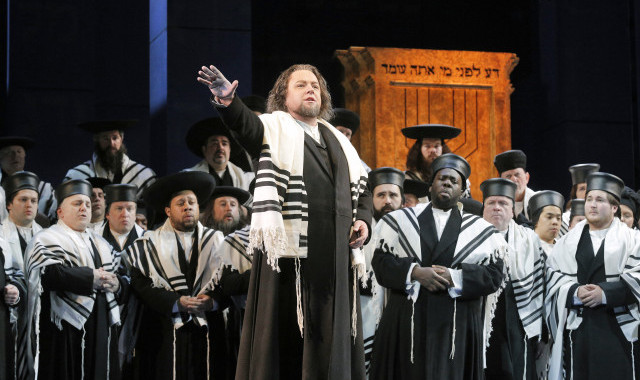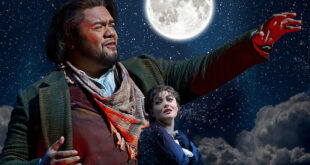
The real star of “Nabucco” is the chorus, and conductor Carlo Rizzi clearly understands this, as he gave the celebrated body their head. And under the direction of Chorus Master Michael Black, they sang more exuberantly than ever, thrilling the jam-packed Civic Opera house audience that braved single-digit temperatures to see the opera that launched Verdi’s career as the King of Italian Opera.
Again and again, the chorus, if Hebrews, Babylonians or whatever, made the very most of each choral number. And they were consistently excellent whether singing distinctly as a chorus, like the famous Act III, scene ii “Va, pensiero,” or accompanying a soloist, or providing an interlude in a recitative-aria-cabaletta in this formally traditional piece.
There was one number in particular that struck me as significant in terms of why we in Chicago are so fortunate to have a truly big-time opera company like Lyric. One of the top two singers in the production was bass Dimitry Belosselskiy, as Zaccaria. In Act II, scene ii he sang the prayer-aria, “Vieni, o Levita,” which he delivered beautifully. But it was the accompaniment of cellos, that you just cannot possibly hear live without the kind of orchestra that a company like the Lyric has, that made this number so magnificent.
The prima donna part of Abigaille is extremely difficult, and very few sopranos have the technique — or the guts — to take it on. It entails a vast range (at one point there is an incredible two-octave jump) plus the usual Bel Canto coloratura pyrotechnics. Lyric’s Abigaille, soprano Tatiana Serjan, was well up to the challenge and sang superbly, especially her Act II, scene i, “Anch’io dischiuso un giorno.”
But I believe that Madame Serjan was let down by both the stage director and costume designer. If they had given her more attention her character could have been far more formidable, as Verdi surely intended.
The title role was, compared to the others, somewhat disappointing. Baritone Željko Lučić is a professional singer with a good voice, but not a real big one. Nor is he a strong actor with the kind of commanding stage presence that one would expect in a Nabucco. Nevertheless he sang all the right notes and blended in well with the ensembles. He, too, may have been served better by some abler stage direction.
Although Verdi scored the role of Nabucco’s daughter Fenena for a soprano, it is fashionable for it to be performed by a mezzo, and so it is in Lyric’s production by Elizabeth DeShong. She sang very well as did tenor Sergei Skorokhodov as Ismaele. Although these two are really minor characters they constitute the obligatory love interest in every Italian opera of the time. The duo also provided librettist Solera with something of a love triangle, along with Abigaille, to work with.
Tenors weren’t so important back then, but they now and the “Nabucco” audience showed it. Now, next season. there are some very important tenor roles coming up. How will they go? I can hardly wait to find out!
 Fra Noi Embrace Your Inner Italian
Fra Noi Embrace Your Inner Italian






